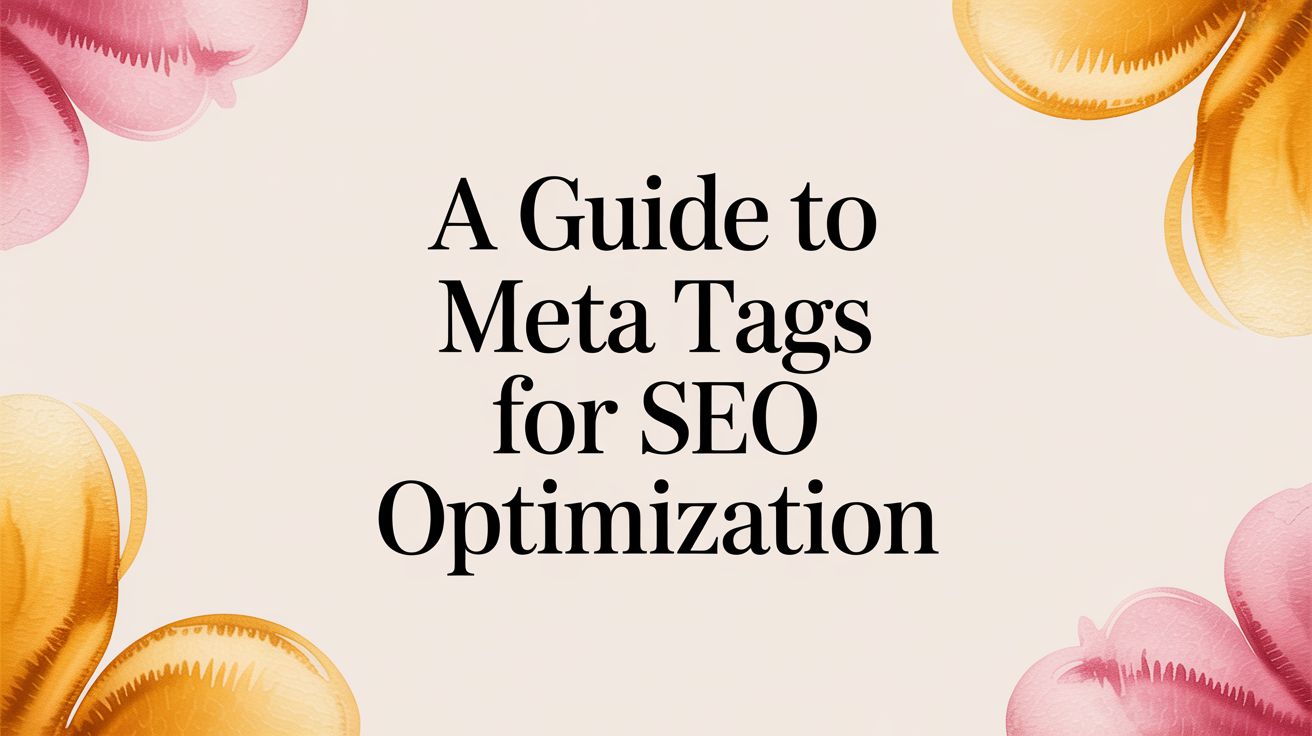SEO keyword cannibalization hits cannabis and local businesses harder than most people realize. You might think having more pages targeting popular search terms would mean more visibility. Suddenly the exact opposite is true and sites can lose up to 30 percent of their organic traffic when pages compete for the same keyword. With so much at stake, understanding and fixing this problem can turn a silent traffic drain into your biggest SEO advantage.
Table of Contents
- Understanding SEO Keyword Cannibalization Risks
- How Cannibalization Impacts Cannabis And CBD SEO
- Effective Solutions For Ecommerce And Retail Sites
- Best Practices To Prevent SEO Keyword Cannibalization
Quick Summary
| Takeaway | Explanation |
|---|---|
| Identify Keyword Cannibalization | Recognize when multiple pages compete for the same keywords, harming SEO performance. |
| Consolidate Similar Content | Merge redundant pages to strengthen individual page authority and ranking potential. |
| Implement Technical SEO Strategies | Use 301 redirects and canonical tags to clarify which pages should rank for specific keywords. |
| Map Keywords Strategically | Assign unique keywords to each page to prevent overlap and confusion. |
| Regularly Audit Content | Continuously review existing content to identify and address potential keyword conflicts. |
Understanding SEO Keyword Cannibalization Risks
Search engine optimization (SEO) demands strategic precision. For cannabis and local businesses, keyword cannibalization represents a silent killer of organic search performance that can dramatically undermine digital marketing efforts.
What Exactly is Keyword Cannibalization?
Keyword cannibalization occurs when multiple pages on your website target identical or extremely similar keywords, essentially competing against themselves in search engine results. According to Yoast, this phenomenon creates confusion for search engines, causing them to struggle in determining which page should rank for a specific query.
In practical terms, imagine you’re a local cannabis dispensary with three different pages attempting to rank for “best cannabis products” – each page dilutes the potential ranking power of the others. Search engines become uncertain about which page represents the most authoritative content, potentially reducing overall visibility.

The Hidden Consequences for Cannabis and Local Businesses
Search Rankings: When keyword cannibalization happens, search engines cannot clearly identify which page should receive priority. Similar Web research reveals that affected websites often experience pages “swapping” impressions in search results, leading to inconsistent and unpredictable organic traffic.
Specifically for cannabis and local businesses, this means potential customers might never find your most relevant content. A dispensary competing against its own pages could see critical product descriptions or location-based pages buried in search results, directly impacting revenue and customer acquisition.
The risks extend beyond mere ranking challenges. Keyword cannibalization can:
- Reduce Click Through Rates: Multiple competing pages decrease overall click probability
- Dilute Page Authority: Splitting link equity across similar pages weakens individual page strength
- Confuse Search Engine Algorithms: Creates uncertainty about your content’s primary focus
Effective SEO requires strategic keyword allocation and clear content differentiation. By understanding and addressing keyword cannibalization, cannabis and local businesses can optimize their digital presence, ensuring each page serves a unique and valuable purpose in attracting potential customers.
Navigating this complex landscape demands a systematic approach. Businesses must audit their existing content, identify potential keyword overlap, and develop a precise content strategy that maximizes search engine visibility while maintaining clear, targeted messaging.
Here is a summary table outlining the key consequences of keyword cannibalization for cannabis and local businesses:
| Consequence | Description |
|---|---|
| Reduced Search Rankings | Search engines struggle to prioritize relevant pages, causing ranking volatility |
| Lower Click Through Rates | Competing pages reduce the likelihood of any single page receiving clicks |
| Diluted Page Authority | Link equity and authority are split among similar pages, weakening overall SEO performance |
| Confused Algorithm Signals | Search engines are uncertain about content focus, impacting page relevance |
| Fragmented Customer Experience | Users may encounter inconsistent or redundant information across multiple pages |
How Cannibalization Impacts Cannabis and CBD SEO
The cannabis and CBD industries face unique digital marketing challenges, with SEO keyword cannibalization posing a significant threat to online visibility and customer acquisition strategies. These specialized markets require precise digital navigation to maintain competitive search rankings.
Competitive Search Landscape Challenges
Cannabis and CBD businesses operate in a highly regulated digital environment where search visibility can make or break revenue potential. According to The Cannabis Marketing Agency, keyword cannibalization creates substantial complications by forcing multiple pages to compete against each other in search results.
For dispensaries and CBD retailers, this means potential customers might struggle to find critical information about products, locations, or services. When search engines encounter multiple pages targeting similar keywords, they become confused about which page should rank highest, ultimately reducing overall organic search performance.
Revenue and Visibility Implications
Traffic Fragmentation: Research from Retent reveals that keyword cannibalization can dramatically lower click-through rates and conversion potential. By splitting incoming traffic across multiple competing pages, businesses inadvertently reduce their ability to capture and convert potential customers.
Specifically in the cannabis sector, this fragmentation can mean losing valuable leads to competitors who have more strategically structured their digital content. Search engines prioritize comprehensive, authoritative content – and keyword cannibalization directly undermines this goal.
The consequences extend beyond mere ranking challenges:
- Reduced Organic Reach: Competing pages dilute individual page authority
- Confused Customer Journeys: Potential clients encounter inconsistent information
- Lower Conversion Potential: Fragmented content reduces trust and engagement

Strategic Content Optimization
Growth Marketing Insights emphasizes that instead of creating multiple limited, redundant web pages, businesses should focus on developing comprehensive content that demonstrates expertise.
For cannabis and CBD businesses, this means carefully mapping keywords, creating distinct content strategies for each page, and ensuring that every piece of digital real estate serves a unique purpose. Successful SEO in this sector requires understanding not just keywords, but the nuanced intent behind customer searches.
Businesses must develop a holistic approach that treats each page as a strategic asset, carefully curating content to address specific customer needs while maintaining a cohesive overall digital presence. By eliminating keyword cannibalization, cannabis and CBD companies can transform their SEO from a potential liability into a powerful customer acquisition tool.
Effective Solutions for Ecommerce and Retail Sites
Navigating keyword cannibalization requires strategic intervention, especially for ecommerce and retail sites in competitive industries like cannabis and CBD. Businesses must implement targeted solutions to optimize their digital presence and search engine performance.
Content Consolidation and Restructuring
Backlinko’s comprehensive guide outlines critical strategies for addressing keyword overlap. For ecommerce platforms, this means carefully consolidating similar content pages and implementing precise structural changes.
Key consolidation techniques include:
- Merging Similar Product Pages: Combine redundant product descriptions into comprehensive, authoritative pages
- Creating Hierarchical Content Structures: Develop clear content taxonomies that distinguish between product categories, variations, and informational content
- Eliminating Duplicate Content: Remove or redirect pages that compete for identical search terms
Below is a table summarizing content consolidation and technical SEO optimization strategies for ecommerce and retail cannabis/CBD sites:
| Strategy | Purpose | Benefit |
|---|---|---|
| Merging Similar Product Pages | Combine redundant descriptions & listings | Strengthens authority and improves rankings |
| Creating Hierarchical Content Structures | Structure content by category, variation, info | Provides clarity for users and search engines |
| Eliminating Duplicate Content | Remove or redirect pages targeting same terms | Prevents internal competition & confusion |
| 301 Redirects | Redirect old/redundant URLs to authoritative content | Consolidates ranking signals |
| Canonical Tags | Signal the preferred URL among similar pages | Helps search engines prioritize the right page |
Technical SEO Optimization Strategies
REToolkit research emphasizes the importance of technical interventions. Ecommerce and retail sites can leverage several advanced techniques to mitigate keyword cannibalization:
301 Redirects: Strategically redirect competing pages to the most authoritative content, consolidating ranking potential. This approach helps search engines understand the preferred page for specific keywords.
Canonical Tags: Implement canonical tags to signal the primary version of similar pages. For cannabis and CBD retailers, this means clearly indicating which page should be considered the definitive source for specific product or category searches.
Advanced Site Architecture Solutions
AddSearch highlights that preventing keyword cannibalization requires a holistic approach to site design. Retail and ecommerce sites must develop sophisticated content strategies that go beyond simple page management.
Effective strategies include:
- Conducting regular content audits
- Optimizing internal linking structures
- Implementing dynamic site search solutions
- Creating unique, intent-focused content for each page
For cannabis and CBD businesses, this means developing a nuanced approach that considers regulatory constraints, product specificity, and user search intent. Each page must serve a distinct purpose, whether providing product information, educational content, or location-specific details.
Successful keyword management transforms potential SEO challenges into opportunities for improved visibility. By implementing these strategic solutions, ecommerce and retail sites can create a more coherent, search-engine-friendly digital presence that effectively captures and converts potential customers.
Ultimately, addressing keyword cannibalization is not about eliminating content but strategically organizing and optimizing it. Businesses that approach their digital strategy with precision and intentionality will see significant improvements in search rankings, user engagement, and overall online performance.
Best Practices to Prevent SEO Keyword Cannibalization
Preventing keyword cannibalization requires a proactive and strategic approach, especially for cannabis and local businesses navigating complex digital marketing landscapes. Implementing systematic practices can help organizations maintain robust search engine optimization and maximize online visibility.
Strategic Keyword Mapping and Content Planning
Search Engine Land highlights the critical importance of building a comprehensive keyword and content map before creating digital assets. For cannabis and local businesses, this means meticulously assigning specific target keywords to individual pages during the initial content development phase.
The key steps in effective keyword mapping include:
- Conducting Thorough Keyword Research: Identify unique, relevant keywords for each page
- Creating a Content Hierarchy: Establish clear relationships between pages and keywords
- Documenting Keyword Assignments: Maintain a centralized tracking system for keyword allocation
The following table outlines the main best practices for preventing keyword cannibalization and their actions:
| Best Practice | What To Do | Why It Matters |
|---|---|---|
| Conduct Keyword Research | Find unique keywords for each page | Reduces overlap and competition on your site |
| Create Content Hierarchy | Structure your website by topics & relationships | Guides search engines and users effectively |
| Document Keyword Assignments | Use a spreadsheet or tool to track keywords/page | Maintains clarity and enforces strategy |
| Use Canonical Tags | Mark the authoritative version of similar pages | Prevents indexing of duplicate/competing content |
| Implement 301 Redirects | Redirect redundant/older pages to the best page | Consolidates authority and avoids confusion |
| Audit Content Regularly | Review site for overlaps and cannibalization issues | Ensures ongoing SEO health |
Technical SEO Interventions
Clearscope recommends several technical strategies to mitigate keyword overlap and strengthen search performance. These interventions provide search engines with clear signals about content priority and relevance.
Critical technical approaches include:
Canonical Tags: Implement canonical URLs to designate the most authoritative page when similar content exists. This helps search engines understand which page should receive ranking priority.
301 Redirects: Consolidate competing content by redirecting redundant pages to the most comprehensive and relevant resource. This strategy concentrates ranking potential and eliminates keyword confusion.
Comprehensive Content Strategy
Digital Authority Partners emphasizes the significance of a well-organized site structure in preventing keyword cannibalization. For cannabis and local businesses, this means developing a nuanced content approach that goes beyond simple keyword management.
Effective strategies include:
- Developing clear content categories and subcategories
- Creating unique, intent-driven content for each page
- Regularly auditing existing content to identify potential overlaps
- Maintaining a dynamic content strategy that adapts to evolving search trends
Successful keyword cannibalization prevention requires ongoing commitment. Businesses must continuously monitor their digital content, reassess keyword strategies, and remain agile in their approach to search engine optimization.
By implementing these best practices, cannabis and local businesses can transform potential SEO challenges into opportunities for enhanced online visibility. The goal is not just to avoid keyword conflicts but to create a robust, authoritative digital presence that effectively connects with target audiences and drives meaningful engagement.
Frequently Asked Questions
What is SEO keyword cannibalization?
Keyword cannibalization occurs when multiple pages on your website target the same or very similar keywords, causing your pages to compete with one another in search engine results. This can dilute your ranking potential and visibility.
How does keyword cannibalization affect cannabis and local businesses?
In the cannabis and local business sectors, keyword cannibalization can significantly reduce search rankings, click-through rates, and overall organic traffic. This results in potential customers struggling to find the most relevant content, ultimately impacting revenue and customer acquisition.
What are some solutions to fix keyword cannibalization?
To address keyword cannibalization, businesses can merge similar content pages, implement 301 redirects and canonical tags, and conduct regular content audits to identify and resolve potential overlaps.
How can I prevent keyword cannibalization in my content strategy?
To prevent keyword cannibalization, conduct thorough keyword research, create a clear content hierarchy, document keyword assignments, and regularly audit your existing content for overlaps. This proactive approach ensures each page targets unique keywords.
Stop Letting Keyword Cannibalization Drain Your Cannabis SEO
Does your cannabis or local business website struggle with lost rankings, inconsistent traffic, and content that seems to compete with itself? If you have discovered that multiple pages are targeting similar search terms — a classic case of keyword cannibalization — you are already aware that this can cost up to 30 percent of your valuable organic visits. Ignoring this problem means risking lost customers, weaker authority, and missed revenue opportunities. The pain of seeing your site outranked by competitors when it deserves attention is real, especially in highly regulated industries like cannabis.

Take control of your search presence today. At Juiced Digital, we offer technical audits, AI-powered content mapping, and local SEO systems designed to remove content overlap and maximize your site authority. Do not let another day go by while silent SEO issues hold you back. Visit Juiced Digital now to see how smarter solutions can fix cannibalization for good and help your site reach its true potential.




